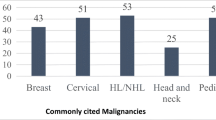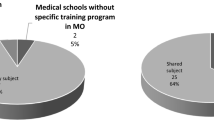Abstract
Oncologists must have a strong understanding of collaborating specialties in order to deliver optimal cancer care. The objective of this study was to quantify current interdisciplinary oncology education among oncology training programs across the USA, identify effective teaching modalities, and assess communication skills training. Web-based surveys were sent to oncology trainees and program directors (PDs) across the USA on April 1, 2013 and October 8, 2013, respectively. Question responses were Yes/No, five-point Likert scales (1 = not at all, 2 = somewhat, 3 = moderately, 4 = quite, 5 = extremely), or free response. Respondents included the following (trainees/PDs): 254/55 medical oncology, 160/42 surgical oncology, 102/24 radiation oncology, and 41/20 hospice and palliative medicine (HPM). Trainees consistently reported lower rates of interdisciplinary education for each specialty compared with PDs as follows: medical oncology 57 vs. 77% (p < 0.01), surgical oncology 30 vs. 44% (p < 0.01), radiation oncology 70 vs. 89% (p < 0.01), geriatric oncology 19 vs. 30% (p < 0.01), and HPM 55 vs. 74% (p < 0.01). The predominant teaching method used (lectures vs. rotations vs. tumor board attendance vs. workshop vs. other) varied according to which discipline was being taught. The usefulness of each teaching method was rated statistically different by trainees for learning about select disciplines. Furthermore, statistically significant differences were found between PDs and trainees for the perceived usefulness of several teaching modalities. This study highlights a deficiency of interdisciplinary education among oncology training programs in the USA. Efforts to increase interdisciplinary education opportunities during training may ultimately translate into improved collaboration and quality of cancer care.
Similar content being viewed by others
References
Siegel RL, Miller KD, Jemal A (2016) Cancer statistics, 2016. CA Cancer J Clin 66:7–30. doi:10.3322/caac.21332
IOM (Institute of Medicine) (2013) Delivering high-quality cancer care: charting a new course for a system in crisis. The National Academies Press, Washington DC
Harris PA, Taylor R, Thielke R, Payne J, Gonzalez N, Conde JG (2009) Research electronic data capture (REDCap)—a metadata-driven methodology and workflow process for providing translational research informatics support. J Biomed Inform 42(2):377–381. doi:10.1016/j.jbi.2008.08.010
Rowley BD (1988) AMA—Fellowship and Residency Electronic Interactive Database Access (AMAFREIDA): a computerized residency selection tool. JAMA 260(8):1059
Naeim A, Hurria A, Rao A, Cohen H, Heflin M, Seo P (2010) The need for an aging and cancer curriculum for hematology/oncology trainees. Journal of Geriatric Oncology 1(2):109–113
Schneider EL, Guralnik JM (1990) The aging of America. Impact on health care costs. JAMA 263(17):2335–2340
Martinez SR, Beal SH, Chen SL, Canter RJ, Khatri VP, Chen A, Bold RJ (2010) Disparities in the use of radiation therapy in patients with local-regionally advanced breast cancer. Int J Radiat Oncol Biol Phys 78(3):787–792. doi:10.1016/j.ijrobp.2009.08.080
Back AL, Arnold RM, Baile WF, Fryer-Edwards KA, Alexander SC, Barley GE, Gooley TA, Tulsky JA (2007) Efficacy of communication skills training for giving bad news and discussing transitions to palliative care. Arch Intern Med 167(5):453–460. doi:10.1001/archinte.167.5.453
Acknowledgements
This project was funded in part by the University of Chicago Center for Research Informatics grant (NIH UL1 RR024999). Dr. Golden had full access to all of the data in the study and takes responsibility for the integrity of the data and the accuracy of the data analysis.
Author information
Authors and Affiliations
Corresponding author
Ethics declarations
Research Support
This project was funded in part by the University of Chicago Center for Research Informatics grant (NIH UL1 RR024999).
Prior Presentations/Publications
Preliminary trainee data was presented at the 2013 International Cancer Education Conference (ICEC), Seattle, WA. Updated trainee data was presented at the 2014 University of Chicago Medical Education Day, Chicago, IL. Trainee versus program director data was accepted as a published abstract at the 2014 American Society of Clinical Oncology (ASCO) meeting, Chicago, IL.
Ethical Standards
All procedures were in accordance with the ethical standards laid down in the 1964 Declaration of Helsinki and its later amendments. Survey participation was voluntary for all participants of this study.
Conflict of Interest
Dr. Golden reports having a financial interest in RadOncQuestions, LLC. No other authors report potential conflicts of interest.
Rights and permissions
About this article
Cite this article
Akthar, A.S., Hellekson, C.D., Ganai, S. et al. Interdisciplinary Oncology Education: a National Survey of Trainees and Program Directors in the United States. J Canc Educ 33, 622–626 (2018). https://doi.org/10.1007/s13187-016-1139-6
Published:
Issue Date:
DOI: https://doi.org/10.1007/s13187-016-1139-6




